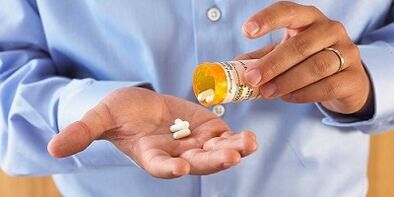If prostatitis occurs, special treatment may be required.Diseases of bacterial nature develop in one-third of patients.Use appropriate drugs to inhibit the growth needs of bacteria.When the diagnosis is confirmed through preliminary examination, an antibiotic for prostatitis will be prescribed.To make the treatment come into effect as expected, be as careful as possible to work on the body, choose the best medications that can help you figure out how to take them and potential threats to use.
Advantages of antibiotic therapy
Modern medicine’s ability to use antibiotics for prostatitis or other diseases:
- Rapidly destroy the root cause of the disease and eliminate inflammation;
- Develop substances that kill or stop bacteria and large viruses from spreading, but are safe for macroscopic biological cells.
- External (candles, ointments) and other administration methods: intramuscular, oral, intravenous;
- Fighting with many pathogens (broad spectrum antibiotics).
The main groups of antibacterial drugs used in prostatitis
Antibiotics are a relatively new substance that opened up in the 1920s.A large list of drugs neutralizes the virus and helps eliminate causes of prostatitis and other diseases.Different properties of the effects and differences in chemical structures make it differentiated from bacterial prostatitis: chronic or acute.
Fluoroquinolonone
Today, fluoroquinolones are chemically synthesized.Active substances affecting different types of bacteria are particularly treated in chronic forms of the disease.Absorb the fluorosaurus into the gastrointestinal tract as quickly as possible.From here they move easily inside the cells of organs and tissues, destroying bacteria.Drugs can cause allergies in the gastrointestinal tract and nervous system.In rare cases, diseases of the kidney, musculoskeletal system, heart, candidiasis, colitis are observed.
tetracycline
The tetracycline family includes a wide range of antibiotics with ingredients and properties.They have mechanisms of influence on microorganisms, close-range characteristics and complete transstability.If a drug stops acting on the body, these drugs will also be ineffective.To achieve the results, it is best to use drugs with different working methods.Tetracycline is highly active against bacteria, causing prostatitis, but it is difficult to metastasis.
penicillin
Penicillin blocks the synthesis of peptidoglycans from which the cell walls of bacteria are built.They are dead.The mammalian body does not produce peptide drugs, so drugs are safe for a person, the only thing that can be encountered, taking them - allergies.The most common drug for prostatitis in the penicillin group is tablets.
Cephalosporin
The bactericidal principle of cephalosporin action is dangerous to microorganisms.It damages their cell walls and causes death.The drug absorption of this group from the gastrointestinal tract is weak.They can stimulate the mucosa, cause allergies, kidney disease, and the risk of meningitis is contraindicated.Intramuscular use.
Macrolides
Macrolides are the least toxic antibiotics of natural origin that prevent bacteria from reproduction.These drugs are rarely used because there is no proven effectiveness.Patients are well tolerated with prostatitis of these drugs.Preparations rarely contribute to the occurrence of allergies and do not inhibit the damage of liver or kidney conditions, joints, bone tissue, toxic effects.
Antibiotic dosing regimen for male prostatitis treatment
To effectively cure the disease, a diagnosis is necessary, which will show the type of bacterial effect of the disease in a particular patient, and their sensitivity to the drug.Based on the results of the test, the doctor decides what the meaning of treating chronic prostatitis or acute form of the disease is.If the disease develops due to bacteria, a set of procedures will help relieve inflammation in the prostate.
Treatment options for prostatitis include:
- Take antibiotics to eliminate bacteria;
- Use medications to improve blood circulation and reduce congestion;
- Add anti-inflammatory drugs - if you need to reduce edema in your glands to calm the pain;
- substances that regulate the immune system;
- Vitamins A, B6, E, C;
- Microelements: selenium, zinc, magnesium;
- sedative;
- herbs (Lingonberry, Elterberry, St. John's Wort, Trench and Goldener);
- Prostate massage - It relieves inflammation and eliminates the secret of stagnation;
- Exercise - stimulates blood circulation.
Acute pathological forms
Treatment is performed under medical control at the hospital or at home.Use of drugs that affect the overall effect: cephalosporin, tetracycline, inflammation-fluoroquinolones.For quick results, urologists can prescribe two antibiotics.
Usually, the results of treating acute inflammation can be seen immediately, but it is absolutely impossible to stop taking medication.Extend the 4-week course to the end and observe the dose accurately to prevent the inflammatory process.Otherwise, it can be transformed into a chronic form.If you clearly fulfill all the advice of your urologist, the disease will retreat forever and will not recover.
In chronic prostatitis

The chronic course of prostate disease is observed more frequently.The period of calm is replaced by aggravated.Has chronic prostatitis been treated?In the case of acute inflammation, the predicted comfort is less.The results of treatment are weak: pathology changes the structure of gland tissue, so antibiotics do not linger for a long time.Dating:
- Given the nature and extent of the sensitivity of microorganisms, the formulation is prescribed.
- Highly effective drugs with various effects, especially cephalosporins and macrolides, fluoroquinolones.
- The minimum course is one month, but there are usually several cycles with interruptions.Treatment is impossible when improving the condition: changes can be deceptive.
Which antibiotic is the most effective
Cure or reduce the manifestations of infectious prostatitis and strictly follow the doctor's advice.The course is only started after diagnosis when the doctor figures out the nature of the disease.The independent treatment of the house is full of destructive consequences, failures in the work of the body system.
Are there any side effects and contraindications
Typically, compositions that restore bacterial flora are prescribed.Note this possible response to antibiotics:
- Gastrointestinal malfunction;
- Allergic rash;
- Poisoning (fever, pain, diarrhea);
- The deterioration of the well.
Antibiotics are not used to treat non-infectious (stagnant) inflammation.It is forbidden to take them away:
- allergy;
- Kidney, liver disease;
- Pregnant;
- breast-feeding;
- Children.



























